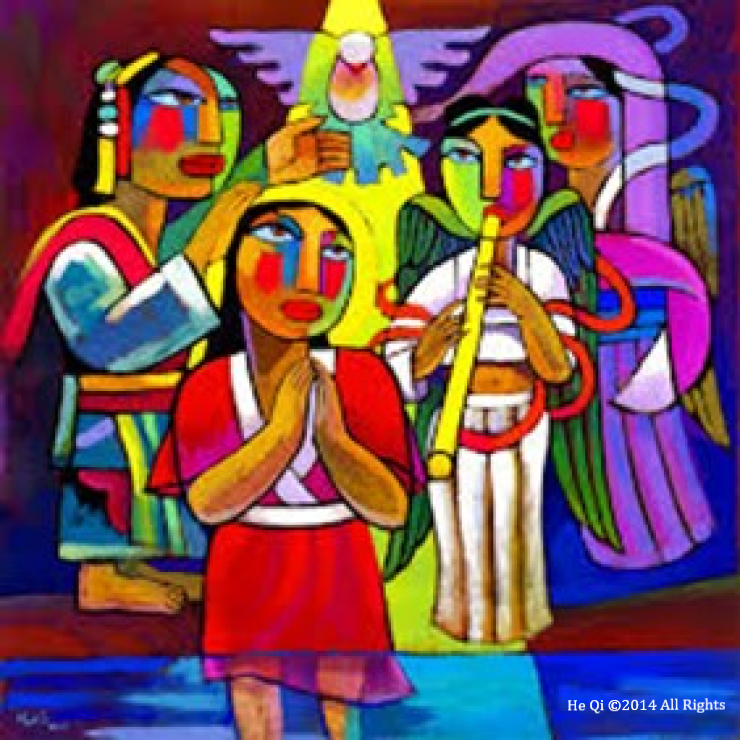John the baptizer appeared in the wilderness, proclaiming a baptism of repentance for the forgiveness of sins. And people from the whole Judean countryside and all the people of Jerusalem were go
ing out to him, and were baptized by him in the river Jordan, confessing their sins. Now John was clothed with camel’s hair, with a leather belt around his waist, and he ate locusts and wild honey. He proclai
med, “The one who is more powerful than I is coming after me; I am not worthy to stoop down and untie the thong of his sandals. I have baptized you with water, but he will baptize you with the Holy Spirit.”
In those days, Jesus came from Nazareth of Galilee and was baptized by John in the Jordan. And just as he was coming up out of the water, he saw the heavens torn apart and the Spirit descending like a dove on him. And a voice came from heaven, “You are my son, the Beloved, with you I am well pleased.”
– Mark 1:4-10
According to the Christian Calendar, this Sunday we celebrate the Baptism of the Lord, which reminds us that our God is a covenantal God. And, as Christians, we are a covenantal people. We are also a covenantal church. And, we are called to live a covenantal life. I am convinced that a way in which we can live a covenantal life is by speaking the truth.
Now, to live a covenantal life will require us to speak the truth of God, just like John, just like those John was baptizing, just like Jesus. Speaking the truth can mean different things to different people. But as Christians, we are talking about a specific truth—the truth of the Gospel of Jesus Christ.
In Mark’s account of Jesus’ baptism, we find three dimensions of what it means to speak the truth—of what it means to live a covenantal life.
First, in our text, we find John the baptizer speaking a very specific truth; he was proclaiming a baptism of repentance for the forgiveness of sins.
Today, as a covenantal people, we are called to do the same. We are called to speak the truth about our need to repent of our sins, so we can receive God’s forgiveness.
Today, God gives us the chance to get the New Year off to a good start. Today is the day to repent of our sins and receive God’s forgiveness. Today is the day to speak the truth and be the voice of the voiceless. Today is the day to address not only individual sins, but also social sin.
We cannot ignore the crisis our world is facing in different areas. We cannot ignore how often no law is more ignored than the greatest of all laws, Jesus’ law of love. We cannot ignore that very often churches are more concerned about numbers, buildings, and maintaining the status quo than about reaching out to the widows, the orphans, the aliens, and the poor. There is indeed a need to speak the truth in the midst of individual and social sin. It is our duty as covenantal people.
The second dimension of speaking the truth, which is inseparable from repentance, is confessing our sins. Remember, our text for this morning clearly states, “people from all the Judean country side and all the people of Jerusalem were going out to [John], and were baptized by him, confessing their sins.” Confession has become a statement that we recite each time we prepare for communion, but it should be more than that.
Confession is about being honest with God, with ourselves, and with each other. Confession is about speaking the truth to God, to ourselves, and to each other. I am convinced that as we learn to confess our sins, we also learn to live a covenantal life. In the letter of James we find the following statement, which explains the importance of confession: “Therefore confess your sins to one another, and pray for one another, so that you may be healed.” (James 5:16)
As Wesleyans, confession is central in our life together and we believe that when we speak the truth by confessing our sins, we experience healing. As a covenantal people called to speak the truth we need to remember that there is no repentance without confession of sins and vice versa. Once again, today is the day God is giving us to confess our sins and in doing so, be honest with God, with our selves, and with each other.
The third and last dimension of speaking the truth is about speaking the truth not only with what we proclaim and confess, but also with our actions. I see an echo of Jesus’ act of letting John baptize him in Paul’s Letter to the Philippians. Paul describes it in the following way: “Let the same mind be in you that was in Christ Jesus, who, though he was in the form of God, did not regard equality with God as something to be exploited, but emptied himself, taking the form of a slave…” We are called to speak the truth with our actions, but specifically, by imitating Truth made flesh. We are called to humble ourselves for the sake of others.
Sadly, very often our society make it really hard to imitate Jesus’ humbleness. We do not want to be one of the crowd. We want to be seen as the smartest and wisest by our peers. But, remember, at the end, the opinion that really matters is from the voice that came from heaven recognizing Jesus as the Son, the Beloved, the One in whom God was well pleased. Today is the day God gives us to start this New Year continue living as covenantal people, as people who speak the truth without reservations.
I am no longer my own, but yours. Put me to what you will, rank me with whom you will; put me to doing, put me to suffering; let me be employed for you, or laid aside for you, exalted for you, or brought low for you; let me be full, let me be empty, let me have all things, let me have nothing: I freely and wholeheartedly yield all things to your pleasure and disposal. And now, glorious and blessed God, Father, Son and Holy Spirit, you are mine and I am yours. So be it. And the covenant now made on earth, let it be ratified in heaven. Amen.
If you would like to view past editions of Time with Ismael, follow this link: https://heritagedistrictnc.org/category/from-the-ds/


